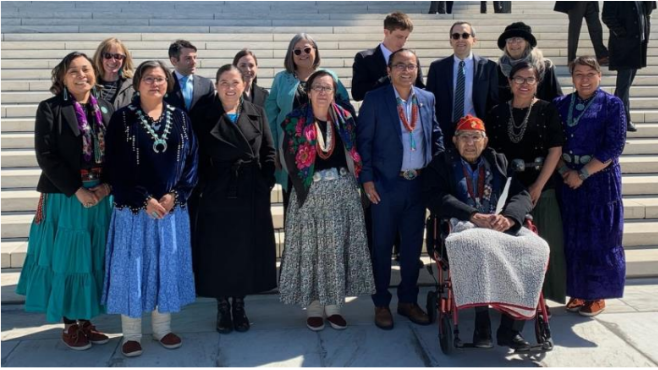NAVAJO NATION WATER RIGHTS INTACT AFTER SCOTUS RULING
Supreme Court’s decision opens opportunities for litigation, legislation to secure water claims

(Navajo Nation officials, legal team, and elder statesman at the Supreme Court after oral arguments in Arizona v. Navajo Nation) Photo Credit: Navajo Nation Department of Justice
WINDOW ROCK, NAVAJO NATION – Thursday, June 29, 2023—Last week’s Supreme Court decision in Arizona et al. v. Navajo Nation did not give the relief the Nation sought, which was a modest request for the United States to assess the Nation’s water needs and develop a plan to meet them. The decision does not take away from or touch upon any of the Nation’s existing water rights. In fact, the decision made key points that give the Nation additional options moving forward to secure a future claim to water from the Colorado River to support future generations of Navajo communities, agriculture and livestock.
“The Supreme Court’s ruling does not say that we have lost any water rights; our water rights remain intact. In this case, we simply asked the United States as trustee to help the Navajo Nation quantify how much water the Navajo people have a right to, and they turned us away,” said Navajo Nation President Buu Nygren. “Water is sacred to the Navajo people, and it is needed in all areas of development. For the Navajo Nation to develop and prosper, and meet the needs of our growing population, we need to know how much water we have access to.”
The 5-4 decision held that the Navajo’s 1849 and 1868 Treaties do not require the United States to take “affirmative steps” to secure water for the Nation. However, the decision made an important acknowledgement – it agreed that the government holds water rights in trust for the Navajo Nation, which is critical to future water claims.
“We want to tell the Navajo people that our claim to rights of the Colorado River were not lost in the ruling. It is important that we stay positive as leadership even though we are put back in a familiar position as Navajo people have been urging this reconciliation for years. If anything, this ruling motivates us to get back in the fight for our homelands and claims to water,” said Navajo Nation Council Speaker Crystalyne Curley.
Though the Court’s decision may seem devastating to the Nation’s water rights, it actually gave the Nation options to pursue by upholding Winters v. United States, the bedrock of federal Indian water law. The majority’s opinion left open the possibility that the Nation can intervene in (Continue Reading).